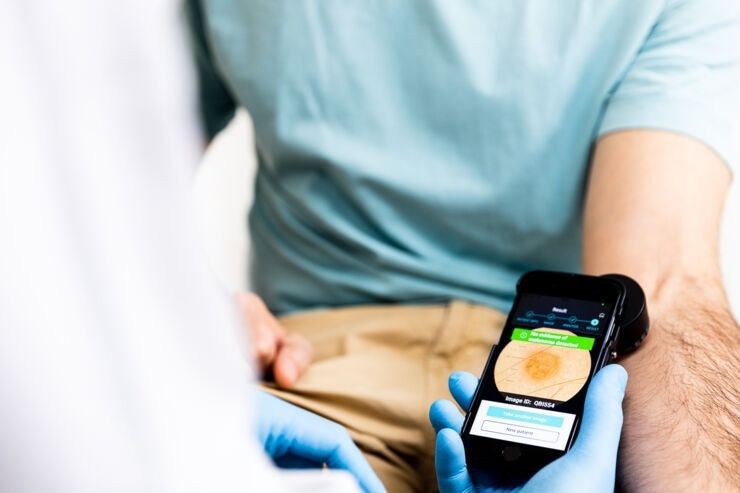Reviewed by Lexie CornerMar 21 2024
A mobile app that utilizes artificial intelligence (AI) to analyze images of skin lesions can detect melanoma with high precision. These findings were demonstrated in research led by Linköping University, where the app was tested in primary care settings. The findings, published in the British Journal of Dermatology, mark a significant step forward for early skin cancer detection.
 Researchers have tested an AI-based mobile app for melanoma in primary care. Image Credit: AI Medical Technology
Researchers have tested an AI-based mobile app for melanoma in primary care. Image Credit: AI Medical Technology
Our study is the first in the world to test an AI-based mobile app for melanoma in primary care in this way. A great many studies have been done on previously collected images of skin lesions, and those studies relatively agree that AI is good at distinguishing dangerous from harmless ones. We were quite surprised by the fact that no one had done a study on primary care patients.
Magnus Falk, Senior Associate Professor and Study Lead Researcher, Department of Health, Medicine and Caring Sciences, Linköping University
Falk is a Specialist in General Practice at Region Östergötland.
Early Detection Important
Early detection is crucial for melanoma, a serious skin cancer that can be tricky to distinguish from other skin concerns, even for doctors. Filling a gap in Swedish healthcare, a new AI-powered mobile app shows promise in aiding melanoma diagnosis.
Primary care physicians encounter many skin lesions every day and, with limited resources, need to make decisions about treatment in cases of suspected skin melanoma. This often results in an abundance of referrals to specialists or the removal of skin lesions, which in the majority of cases turn out to be harmless. We wanted to see if the AI support tool in the app could perform better than primary care physicians when it comes to identifying pigmented skin lesions as dangerous or not in comparison with the final diagnosis.
Panos Papachristou, Researcher, Karolinska Institutet
Panos Papachristou, the study's principal author and co-founder of the company that developed the app, is also a specialist in general practice.
Magnus Falk said, “First of all, the app missed no melanoma. This disease is so dangerous that it’s essential not to miss it. But it’s almost equally important that the AI decision support tool could acquit many suspected skin lesions and determine that they were harmless.”
Compared to the Diagnosis
The study followed standard procedures in primary care. Physicians assessed suspected skin tumors, and if melanoma was a concern, patients were either referred to a dermatologist for further diagnosis or underwent removal of the lesion for tissue analysis.
The AI-based app is utilized only after the physician has determined how to address the suspected melanoma. This process involves the physician capturing a picture of the skin lesion using a mobile phone equipped with a dermatoscope, which provides magnification. The app then analyzes the image and offers guidance on whether or not the skin lesion exhibits signs of melanoma.
To assess the effectiveness of the AI-based app as a decision support tool, the researchers compared the app's diagnoses with those made through the standard diagnostic procedure.
Of over 250 skin lesions examined, physicians identified 11 melanomas and ten precursors of cancer, known as in situ melanoma. The AI-based app correctly identified all the melanomas and missed only one precursor. In instances where the app determined that a suspected lesion was not a melanoma, including in situ melanoma, there was a 99.5 % likelihood that this assessment was accurate.
Larger Study Planned
It seems that this method could be useful. But in this study, physicians weren’t allowed to let their decision be influenced by the app’s response, so we don’t know what happens in practice if you use an AI-based decision support tool. So even if this is a very positive result, there is uncertainty and we need to continue to evaluate the usefulness of this tool with scientific studies.
Magnus Falk, Senior Associate Professor and Study Lead Researcher, Department of Health, Medicine and Caring Sciences, Linköping University
Moving forward, the researchers intend to carry out a sizable follow-up primary care study across multiple nations, where the use of the app as an active decision support tool will be contrasted with its complete non-use.
The research was supported by the Analytic Imaging Diagnostics Arena (AIDA) in Linköping, which is funded by the Medtech4Health strategic innovation program, as well as Region Östergötland.
Journal Reference:
Papachristou, P., et al. (2024) The research was supported by the Analytic Imaging Diagnostics Arena (AIDA) in Linköping, which is funded by the Medtech4Health strategic innovation program, as well as Region Östergötland. British Journal of Dermatology. doi.org/10.1093/bjd/ljae021